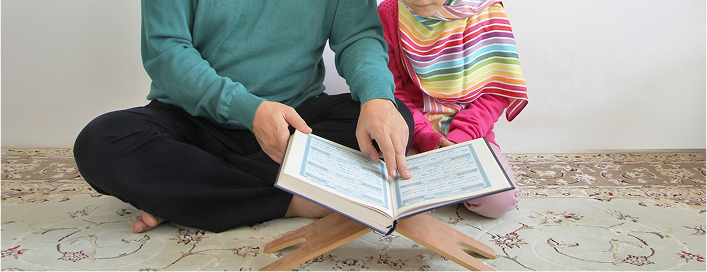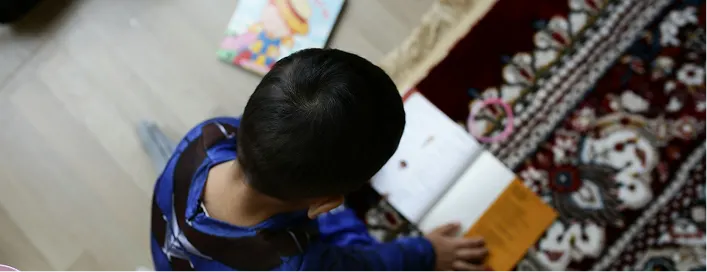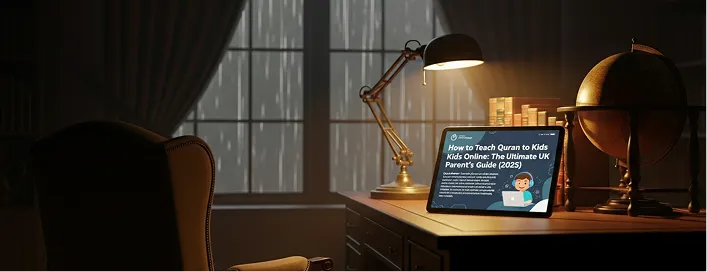Why Learning the Quran for Kids Matters Today:
Learning the Quran for kids is more than just reading Arabic words — it’s about building character, faith, and connection with Allah from an early age. In today’s digital world, where children spend more time on screens than books, guiding them to learn Quran online offers a spiritual balance that shapes both their heart and mind.
What Is the Best Way to Learn Quran for Kids Online?
How Online Quran Classes Simplify Learning for Young Children
Online Quran classes have transformed the way kids learn today. Instead of strict routines or long commutes, children can now enjoy fun, interactive lessons from the comfort of their homes.
Here’s why parents prefer Quran learning for young children online:
- 1-on-1 attention from qualified Quran tutors.
- Flexible timing that fits school schedules.
- Visual aids, games, and rewards that keep kids motivated.
- Safe and comfortable home environment.
- Parents can monitor every session live or through reports.
Whether your child is a complete beginner or already recognizes Arabic letters, Learn Quran for Kids programs are designed to match their exact level and learning speed — making every lesson enjoyable and effective.
How to Teach Quran to Kids Online: A Parent’s Guide:
Setting Realistic Goals for Your Child’s Quran Journey
Every child’s Quran learning path is unique. Start by setting small, realistic goals — like learning the Arabic alphabet or memorizing short Surahs such as Al-Fatiha or Al-Ikhlas.
Break learning into short sessions (20–30 minutes), use repetition, and celebrate every milestone. Remember: kids learn best when they feel encouraged, not pressured.
You can also explore our related article: Learn Quran for Beginners — a helpful guide if you’re planning to start your child’s Quranic journey from scratch.
Creating a Consistent and Fun Learning Schedule
Consistency is key. Pick fixed times that don’t clash with school or play hours — morning sessions work best for focus.
To make Quran learning fun, try:
- Mixing recitation practice with short storytelling breaks.
- Using Quran learning apps for kids alongside live classes.
- Reward charts or “Quran stars” for completed lessons.
When learning becomes part of a joyful routine, kids naturally develop love and curiosity toward the Quran.
Quran Classes for Kids Online: How They Work
Online Quran classes for kids make it simple for parents in the UK to start their child’s Quran journey without leaving home.
Every session happens live with a qualified tutor who knows how to teach children step by step — from letters to fluent recitation.
These classes are designed to make Learn Quran for Kids enjoyable, flexible, and deeply engaging.
- Kids learn through interactive whiteboards and visual tools.
- Parents can choose timings that match school hours.
- Classes are available in both one on one and group formats.
- Progress is tracked weekly, so you can see clear improvement.
- Tutors use gentle correction instead of strict discipline — creating a safe, happy learning space.
One on One vs. Group Classes for Kids
Both options have unique benefits, but the best choice depends on your child’s personality and comfort level.
- 1-on-1 Classes:
Perfect for shy or easily distracted kids. The teacher focuses only on your child’s pace, helping them master pronunciation and tajweed. - Group Classes:
Great for social learners who enjoy friendly competition. They allow kids to listen to each other’s recitation and learn through teamwork.
Most parents begin with one-on-one sessions to build confidence, then gradually move to group lessons once their child feels ready.
What Makes an Effective Online Quran Class
Not all online Quran courses are the same — the best ones use a mix of qualified tutors, structure, and creativity.
Look for these signs of a strong Quran learning for young children program:
- Certified teachers (preferably Al-Azhar graduates).
- Clear curriculum from beginner to advanced levels.
- Use of visuals, games, and repetition to support memorization.
- Short sessions (20–30 minutes) to match children’s attention span.
- Ongoing communication between teacher and parents.
Tip: Visit our Learn Quran Online page to understand how live online Quran lessons are organized for different age groups.
Beginner Quran Course for Kids: Step by Step Progress:
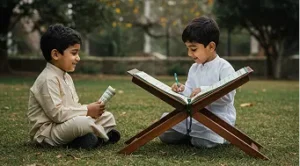
A beginner Quran course for kids is the perfect way to start your child’s journey with confidence. It focuses on building the basics slowly — teaching letters, pronunciation, and simple words before moving to full verses.
These structured online classes make it easy for parents across the UK to help their children Learn Quran for Kids effectively without pressure or confusion.
- The lessons are short and child-friendly (20–25 minutes).
- Tutors focus on tajweed from day one, but in a playful way.
- Every class builds upon the last — step by step.
- Parents receive feedback reports after each session.
- Kids learn to read, understand, and love the Quran naturally.
| Stage | Focus Area | What Kids Learn |
| 1️⃣ Alphabet | Arabic letters | Identify and pronounce letters correctly |
| 2️⃣ Words | Simple Quranic words | Combine letters and read short words |
| 3️⃣ Short Surahs | Early memorization | Recite small surahs with tajweed |
| 4️⃣ Fluent Reading | Full verses | Read confidently with understanding |
From Alphabet to Reading Verses
The journey begins with recognizing Arabic letters, then learning how each connects to form words and verses. Through repetition and color-coded visuals, children progress from identifying sounds to reading complete ayahs clearly.
Here’s how most courses are structured:
- Stage 1: Arabic alphabet and pronunciation (Noorani or Noor Al Bayan method).
- Stage 2: Simple Quranic words and short phrases.
- Stage 3: Complete short Surahs with tajweed focus.
- Stage 4: Confident reading and recitation with correction.
By the end of this stage, your child will be able to open the Quran and recite with understanding — a major milestone for any parent aiming to learn Quran for kids online safely and effectively.
Building Confidence in Quran Recitation
Confidence grows when children are praised and guided patiently. Online tutors trained to teach kids use fun challenges and rewards to motivate them.
To strengthen your child’s confidence in Quran recitation:
- Allow them to read aloud during family prayer times.
- Record short clips of their recitation progress.
- Celebrate small wins, like mastering a new letter or surah.
- Avoid comparing progress between siblings or classmates.
Remember: Quran recitation is not a race — it’s a journey of love, patience, and faith. 🌿
Choosing the Right Online Quran Teacher for Kids:

Choosing the right tutor can make or break your child’s Quran learning journey. The best teachers don’t just teach — they inspire love for the Quran, nurture discipline, and make each session feel exciting instead of stressful.
For parents in the UK searching to Learn Quran for Kids online, selecting a qualified and child-friendly tutor is one of the most important decisions you’ll make.
- Look for teachers who specialize in teaching young children, not just adults.
- Ask for trial lessons before enrollment.
- Ensure the tutor speaks clearly in English and uses simple Arabic terms.
- Choose academies that provide parent updates after each session.
- Prioritize platforms that allow flexible rescheduling and support.
A child who feels comfortable with their teacher will progress faster, stay motivated, and enjoy the process every single day.
Qualities of a Great Kids Quran Tutor
Not every good Quran reciter can teach kids effectively — teaching children requires patience, empathy, and creativity.
Here’s what defines a great online Quran teacher for kids:
- Gentle and encouraging communication style.
- Ability to simplify tajweed rules through examples and visuals.
- Consistent follow-up on the child’s behavior and progress.
- Incorporation of stories and morals to strengthen understanding.
- Respectful attitude that models Islamic manners for kids.
If possible, choose teachers trained specifically in child pedagogy — it ensures they understand how to handle attention spans, learning challenges, and motivation differences.
Why an Al-Azhar Certified Teacher Makes a Difference
Parents often ask why certification matters. The answer is simple: credibility and depth.
An Al-Azhar certified Quran tutor has studied tajweed, tafsir, and teaching methodology at one of the most respected Islamic institutions in the world.
When your child learns from an Al-Azhar graduate:
- You’re assured of authentic Quran pronunciation and rules.
- The child gains early exposure to accurate Islamic understanding.
- The learning journey follows a balanced, traditional yet modern approach.
- You’re investing in a foundation built on trust and scholarly knowledge.
Many top academies like Quran From Home work exclusively with Al-Azhar certified teachers, ensuring your child learns directly from experts in both faith and education.
Fun and Engaging Quran Learning Methods for Children:
When it comes to Learn Quran for Kids, fun isn’t optional — it’s essential. Children learn best when lessons feel like play, not pressure.
That’s why modern online Quran classes for kids combine creativity with structure, helping little learners stay focused and excited about each session.
Here’s how parents in the UK can make Quran learning engaging and consistent at home too 👇
- Mix between live classes and short, interactive games that review what they learned.
- Use story-based teaching — for example, telling short Prophet stories after a lesson.
- Keep a Quran learning journal where your child draws what they understood.
- Use positive reinforcement — like stickers or praise — for every completed surah.
- Encourage children to use a safe Quran app for kids between lessons for revision.
Remember: the goal is to help them love the Quran, not just finish it. When learning becomes joyful, kids stay consistent naturally.
Using Stories, Games, and Visual Aids
Modern Quran platforms have moved far beyond textbooks. They use storytelling, color-coded letters, and mini-games to hold children’s attention.
For example:
- Stories teach values and keep children emotionally engaged.
- Games improve memory and tajweed recognition through repetition.
- Visual aids (charts, animated Arabic letters) make difficult sounds easy to remember.
Even at home, you can support your child by using printable materials or whiteboard drawings to reinforce what they learned in class.
Bonus tip: explore the Best Online Quran Courses comparison to find programs that already include gamified or visual learning tools.
The Role of Positive Reinforcement
A child’s confidence grows when effort is appreciated.
Positive reinforcement — like praise or gentle rewards — encourages consistency and builds emotional connection with the Quran.
Try these simple methods at home:
- Reward every completed lesson with kind words or small treats.
- Celebrate “Quran milestones” — like finishing the first surah or reciting without help.
- Avoid criticism during mistakes; instead, correct softly and show how improvement happens.
- Use “Quran Stars” charts where your child earns stars for attendance and focus.
When children feel supported, they don’t just learn — they start wanting to learn.
How Early Should a Child Start Learning the Quran?
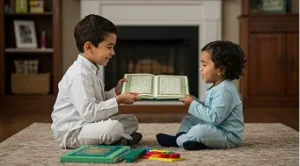
Parents often wonder: When is the right time to begin?
The truth is, it’s not about age — it’s about readiness. Some kids show interest at 4, others at 7. The key is to introduce the Quran gently and naturally from the very beginning.
In the UK, many parents start their Learn Quran for Kids journey as soon as their children can recognize sounds and letters. Early exposure creates comfort with Arabic, even before formal lessons begin.
- Begin with listening to short surahs daily (like Al-Ikhlas or Al-Fatiha).
- Encourage imitation — let your child repeat words after the teacher.
- Keep lessons light and enjoyable, never forceful.
- Focus on pronunciation before memorization.
- Celebrate effort more than results — that’s how love grows.
Quran learning at an early age isn’t about speed. It’s about creating lifelong attachment and understanding.
Understanding the Ideal Age to Begin
Experts in Quran learning for young children suggest ages 4–6 as the best time to begin structured online lessons. At this stage, children are curious, love repetition, and quickly absorb sounds.
Ideal starting signs include:
- Recognizing Arabic letters or English alphabets easily.
- Showing excitement during Islamic stories.
- Paying attention for at least 15 minutes.
- Repeating after the teacher willingly.
If your child isn’t ready yet — no problem. Start with Quran songs or short storytelling sessions instead. When they show interest, formal lessons can start smoothly.
For full beginner guidance, check our related cluster Learn Quran for Beginners — it perfectly complements this stage.
How to Nurture Interest from a Young Age
Inspire curiosity before commitment. Make the Quran part of daily life — not just a “class.”
Here’s how:
- Play Quran recitations in the background during meals or playtime.
- Involve your child in prayer — even if they just imitate your movements.
- Use coloring pages with Arabic letters.
- Tell bedtime stories from the Quran to build emotional connection.
- Praise curiosity (“You listened so well to Surah Al-Nas today!”).
Building love for the Quran early helps kids grow into confident learners later. Every small effort counts. 🌿
Easy Quran Reading Techniques for Young Learners
Reading the Quran shouldn’t feel difficult — especially for kids. The secret is to make every small step rewarding. With the right techniques, children can move from recognizing Arabic letters to reading verses confidently within months.
Modern Learn Quran for Kids programs use proven phonetic and interactive methods that help children decode Arabic sounds naturally and joyfully.
- Start with sounds before letters — “alif” as aah, “baa” as buh.
- Use color-coded Mushafs to highlight tajweed rules.
- Break words into syllables — let kids “tap and read.”
- Encourage slow recitation to focus on clarity.
- Use visuals and short examples from daily surahs.
Patience and repetition are the keys. A few minutes of focused reading every day beats long, tiring sessions once a week.
Phonetic and Noorani Methods Explained:
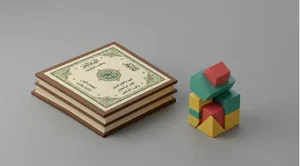
Two of the most effective systems for Quran learning for young children are:
- Phonetic Method:
Teaches pronunciation by connecting Arabic letters with English-like sounds. Perfect for non-Arabic-speaking kids in the UK.
✅ Builds listening and speaking skills early.
✅ Reduces fear of complex Arabic sounds. - Noorani / Noor Al Bayan Method:
Step-by-step approach widely used in beginner Quran classes. It focuses on letter recognition, vowel sounds, and gradual word formation.
✅ Ideal for structured progress from alphabet to reading.
✅ Helps in correct tajweed application early on.
Many parents combine both — phonetics for comfort, Noorani for mastery.
Interactive Recitation Practices
Keeping recitation fun and engaging transforms learning from routine to excitement. Interactive methods boost focus and help kids retain what they learn.
Try these ideas at home or look for academies that use them:
- Echo Reading: The teacher recites, the child repeats immediately.
- Mirror Recitation: The child watches the tutor’s lips and imitates pronunciation.
- Voice Recording Games: Kids record their verses and listen back for improvement.
- Peer Recitation: Siblings or friends recite together in friendly competition.
- Quran Bingo: Use short surahs or tajweed terms as bingo items for quick review.
You can explore more tools in our guide to Best Online Quran Courses — many platforms include built-in recitation games designed just for children.
Best Quran Apps for Kids: Learning Beyond the Classroom
Learning the Quran doesn’t stop when class ends. The right Quran app for kids can help your child revise lessons, memorize short surahs, and stay connected to their teacher’s feedback — all in a fun, interactive way.
In the UK, many parents use apps as a supplement to their child’s Learn Quran for Kids classes, not a replacement. When used wisely, they reinforce what children learn during live lessons and build confidence through repetition.
- Choose apps designed specifically for children (safe, ad-free, and visually simple).
- Set daily goals — even 5–10 minutes of app-based revision works wonders.
- Pair app time with parent review to avoid distractions.
- Reward consistency, not perfection.
- Use apps that include tajweed sounds and reading practice with visuals.
Apps can never replace a real Quran teacher, but they can make every minute count between lessons.
Recommended Apps for Safe, Guided Learning
Here are a few parent-approved tools that combine safety, structure, and fun for kids:
- Quran Companion (Kids Edition): gamified recitation practice.
- Noorani Qaida App: great for learning Arabic letters interactively.
- Muslim Kids Series: includes Quran stories and basic dua recitation.
- Tajweed Made Easy: introduces color-coded pronunciation correction.
- Little Muslim Quiz: turns Quran learning into fun challenges.
Before downloading any app:
✅ Check user reviews for reliability.
✅ Test it yourself to ensure content accuracy.
✅ Make sure it supports the same method your tutor uses (like Noor Al Bayan).
Combine these apps with live lessons on platforms such as Learn Quran Online to keep your child learning safely, consistently, and happily.
How to Combine Apps with Live Quran Classes
Apps work best when used as revision tools — not the main lesson. To get the most out of both worlds:
- Ask your online Quran teacher for kids to suggest specific exercises in the app.
- Use the app right after class for quick review.
- Avoid mixing learning styles (stick to the same curriculum).
- Track progress inside the app weekly.
- Use “family mode” if available, to learn together as a household.
Combining human guidance with digital tools helps children stay motivated and confident even outside class time. 🌿
Balancing Quran Learning and School Education:

For many UK parents, balancing Quran studies with school life feels challenging — but it doesn’t have to be. When structured right, both can complement each other beautifully.
To make Learn Quran for Kids fit smoothly into your child’s daily routine:
- Keep Quran lessons short (20–30 minutes) before or after school.
- Avoid scheduling sessions right after homework time — let the mind rest first.
- Use weekends for review and memorization.
- Communicate with teachers to ensure the schedule stays flexible.
When balanced properly, Quran learning actually improves discipline, memory, and focus in school.
How Parents Can Support Their Child’s Quran Journey
Parental involvement can turn a good learner into a great one. Your role is more than paying for classes — it’s about emotional encouragement.
Practical ways to support your child’s Quran learning journey:
- Sit beside them for the first 5 minutes of class — it shows you care.
- Praise effort, not just results (“I love how you focused today”).
- Ask the tutor for monthly feedback and progress reports.
- Read or listen to Quran together once a week as a family.
- Use gentle reminders instead of pressure — love keeps them consistent.
Explore Learn Quran for New Muslims if you want to understand how first-time learners build faith step by step — it’ll help you relate to your child’s progress better.
Quran Learning for Young Children with Short Attention Spans:
Most young kids can’t focus for more than 15 minutes — and that’s okay. Smart Quran teachers adapt lessons to match children’s attention levels.
To keep focus high during Learn Quran for Kids classes:
- Use short breaks between activities.
- Mix visuals, stories, and voice repetition.
- End lessons on a “high note” — stop before boredom begins.
- Review only one concept per day (like one new letter or surah).
- Add short physical activities (clapping, counting ayahs).
A tired child learns nothing; a happy child learns everything. 🌿
Common Challenges in Teaching Quran to Kids and How to Overcome Them
Every parent faces bumps in the road — boredom, distraction, or inconsistent attendance. These are natural and easy to handle with patience.
Here’s how to overcome common obstacles in Quran learning for young children:
- Boredom: switch methods — use stories or apps.
- Distraction: minimize background noise and devices.
- Forgetfulness: revise daily for just 5 minutes.
- Resistance: use encouragement, not punishment.
- Inconsistency: fix a time slot and protect it like school time.
Remember — progress isn’t linear. Small, steady steps build lifelong connection with the Quran.
Signs Your Child Is Progressing Well in Quran Learning
How do you know it’s working? Simple — look for signs, not speed.
Good progress in Learn Quran for Kids doesn’t mean finishing quickly; it means improving steadily and happily.
Positive indicators include:
- Clearer pronunciation of Arabic letters.
- Excitement before class time.
- Ability to recite short surahs without help.
- Increased attention span and patience.
- Asking questions about meanings or stories.
When kids want to recite, not just have to, you’re on the right track.
How Quran Memorization Can Begin Naturally for Kids:
Quran memorization shouldn’t feel forced — it should come naturally as part of daily recitation. The best way to Learn Quran for Kids is to let memorization happen gradually through repetition and love.
Practical ways to start:
- Begin with short, rhythmic surahs (Al-Ikhlas, Al-Falaq, An-Nas).
- Repeat daily during or after prayers.
- Use audio recordings to improve rhythm and flow.
- Keep sessions short (10 minutes max).
- Celebrate small achievements — one ayah a day is still progress.
Over time, consistent recitation turns into memorization without pressure.
The Role of Parents in Building a Quranic Home Environment:
Children copy what they see. A Quranic home environment isn’t just about classes — it’s about atmosphere.
To nurture faith and discipline at home:
- Play Quran recitations softly in the background.
- Keep a small Mushaf within your child’s reach.
- Begin family gatherings with a short surah.
- Share Prophet stories that link to what your child learned.
- Speak positively about their Quran efforts in front of others.
When the Quran becomes part of daily life, learning flows naturally — it’s no longer “study time,” it’s family time.
Safety and Screen Time Guidelines for Online Quran Classes:
With so much digital learning, balance is crucial. Parents must ensure that online Quran classes for kids remain safe and healthy.
Essential tips for screen-time control:
- Choose platforms with secure video sessions and no external ads.
- Limit total screen exposure per day (including school time).
- Use blue-light filters or night mode for evening lessons.
- Encourage frequent eye breaks (every 20 minutes).
- Monitor sessions occasionally, but without interrupting the tutor.
Balance technology with real-world activities — faith grows best in both worlds. 🌿
Testimonials: Real Stories from Kids Learning Quran Online:
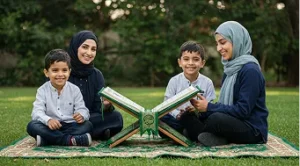
Hearing from other families can help you understand how rewarding this journey can be. Many UK parents found Learn Quran for Kids programs to be a turning point in their child’s confidence and behavior.
Real examples from Quran From Home students:
- “My 7-year-old now leads short prayers at home after just 4 months!”
- “Online Quran classes made my daughter love reading instead of fearing it.”
- “Our son’s teacher from Al-Azhar keeps him excited every single class.”
- “The personalized feedback keeps us updated and motivated as parents.”
Every success story starts with one trial class — and the right support.
Comparing the Best Online Quran Courses for Kids
There are hundreds of platforms out there, but few truly understand how to teach children effectively. When comparing the best online Quran courses for kids, focus on trust, quality, and approach — not just price.
Here’s what to look for:
- Certified teachers (preferably Al-Azhar graduates).
- 1-on-1 options for customized learning.
- Trial lessons to test the teaching method.
- Interactive tools like whiteboards, games, and visual tajweed.
- Support team available 24/7 for parents.
✅ Why choose Quran From Home?
Because it combines flexible scheduling, child psychology–based teaching, and real care for every student’s progress — all while keeping classes fun and faith-centered.
Compare it with others on our Best Online Quran Courses page and see why hundreds of UK families already trust it.
| Platform | Certified Teachers | 1-on-1 Classes | Free Trial | Child-Friendly Interface |
| Quran From Home | ✅ Al-Azhar Graduates | ✅ | ✅ 2 Sessions | ✅ |
| Generic App | ❌ | ❌ | ❌ | ⚠️ Limited |
| Local Mosque Online | ✅ | ⚠️ Group Only | ❌ | ❌ |
Conclusion: Start Your Child’s Quran Journey Today
Helping your child learn the Quran is one of the most beautiful investments you can make — not just for their future, but for your whole family.
Through modern technology and trusted teachers, Learn Quran for Kids programs make it easier than ever for families in the UK to build strong Quranic foundations right from home.
Whether your child is a complete beginner or already reading short surahs, there’s always a next step — a deeper connection, a clearer recitation, a stronger love for Allah’s words.
- Start with a free trial class to see how your child connects with the tutor.
- Choose between 1-on-1 or group sessions.
- Track progress with regular reports and gentle teacher feedback.
- Enjoy flexibility in timing, rescheduling, and class format.
- Watch your child grow in confidence, patience, and faith every week.
Your child’s Quran journey starts with one simple step — Enroll today and discover how easy it is to Learn Quran Online from Home. 🌿
👉 Start your today with “Quran From Home”.
📩 Contact us on WhatsApp to start today

